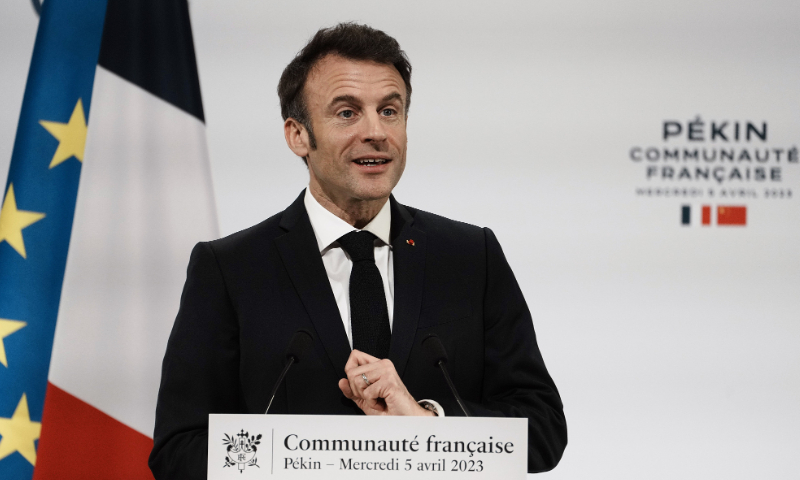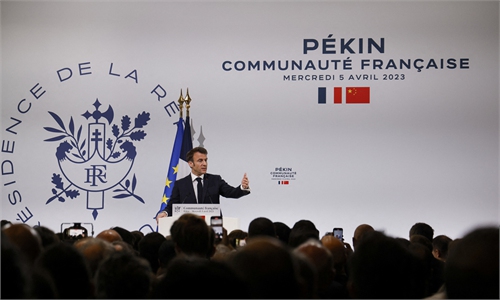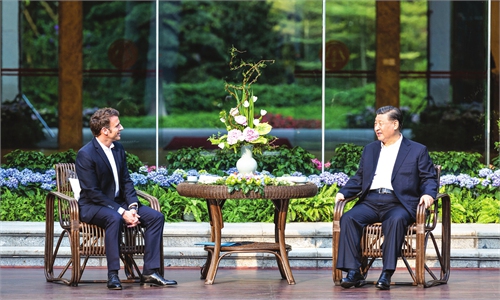
French President Emmanuel Macron gives a speech as he meets the French community, in Beijing, China, on April 5, 2023. Photo: VCG
French President Emmanuel Macron said Europe should avoid "getting into a bloc versus bloc logic," and he also said, "Long live the friendship between China and France!" By stressing Europe's "strategic autonomy," he clearly isn't too concerned about whether people think he "kicked the US," as Washington's control has already made France and Europe feel a certain suffocation.Macron's actions show us the limits of the US' ability to rope in Europe in containing China, and the backlash is happening: Macron is tired of being a "vassal" and wants to drive Europe to be a key player.
Europe is now in a deep crisis, as its dependence on the US has increased significantly because of the Russia-Ukraine conflict. European countries are panicking and increasing their defense spending, but instead of thinking about "European defense," they are embracing the protection of the US out of panic. East European countries in particular trust only the US and NATO. In terms of energy, European nations rejected Russian gas, which gave the US access to the European energy market. This helped Europe to cope with an emergency, but the increased dependence on the US was profound enough to dismantle Europe's strategic autonomy, an issue France cares about the most.
At this time, some forces in Europe are advocating for "getting rid of dependence on China." Isn't this just turning a blind eye to the truth? If European countries try to "decouple" from China, as Washington wants them to, it would be no different from "strategic suicide." They would all become obedient pets lying under the knees and feet of the US. Macron even warned against the "extraterritoriality of the US dollar," proving he wants not only strengthened cooperation between China and France, but also for Europe to be a "third pole" apart from China and the US.
It is not difficult to understand Macron's emotions. The EU's economy is huge, but its strategy is fully controlled by the US. As a result, many European countries have fawned on the US to win favor, which makes European elites like Macron extremely uncomfortable.
Now is the era of the internet. What Macron said in China and what he said to journalists on the plane will quickly spread throughout France, Europe and the world. The reactions of the American and European media are clearly different.
Macron's words have caught US mainstream media outlets and some lawmakers off guard, but ideologically strong Western Europe "tolerates" Macron. The French and European elites who often accuse China of human rights issues seem to have reached a tacit agreement with Macron's pragmatic attitude toward China. It seems they are cooperating with Macron to blur the question of what strengthening cooperation between Europe and China means for ideology. In recent years, the US has spared no effort to promote the idea that the world is in an era of "democracy vs. authoritarianism," and many in Europe have followed suit. Still, Macron's China visit has created a big hole in the ideological iron curtain constructed by the US.
Of course, the Chinese should not think that Macron's remarks mean that France will "stand with China" in the conflict between China and the US in the future. It is unrealistic for anyone to have such an expectation. European countries are unlikely to break away from the US as they have strong connections and are bound together by NATO. Macron's attitude toward China does not mean that European countries will follow the logic of "rebelling" against the US and embracing China. However, we can firmly believe that as long as China treats European countries reasonably and fairly, if the US forces them to confront China, their strategic interests will conflict with those of the US. China can use calmness to control the situation and watch the US become the subject of mockery and ridicule.
France's attitude is the epitome of European countries' pursuit of dignity and self-interest. In fact, no country really wants to be a vassal of US hegemony. US allies in the Asia-Pacific region, such as Japan and Australia, also calculate the balance between the losses and gains of totally obeying the US, and their loyalty to the US is not absolute.
In the long run, China needs to work hard to prevent Europe from becoming like Japan and Australia, while pushing Japan and Australia as much as possible to act like France and Europe. There are two key factors in this process. First, China's comprehensive strength must continue to increase, and second, our strategy of utilizing our strength must be accurate and reasonable. We need to continuously improve the attractiveness of cooperation and friendship with China for all countries in the Asia-Pacific region so that all countries can benefit from China's rise. In this way, we can effectively hedge against the US' formation of an anti-China united front, and also build up momentum to crush it.
The author is a commentator with the Global Times. opinion@globaltimes.com.cn



